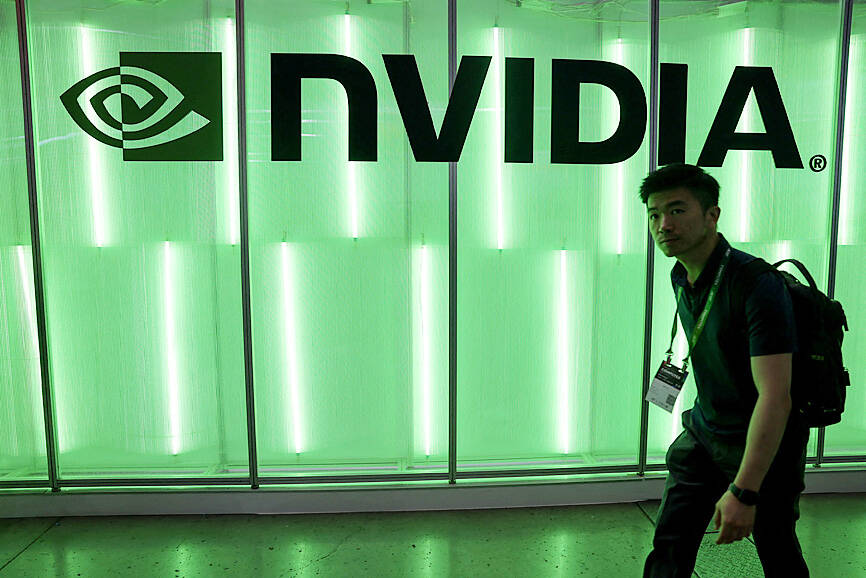Antitrust tensions are heating up in the chipmaking industry, as rivals have accused Wall Street darling Nvidia Corp of abusing its market dominance in selling chips that power artificial intelligence (AI) — and the US Department of Justice is now investigating these complaints, technology news site The Information reported.
The news outlet, which cited unnamed sources familiar with the discussions, said that justice department officials are looking into concerns that Nvidia is potentially cornering the market and pressuring its customers to unfairly retain business.
That includes allegations of Nvidia threatening to punish those who buy products from the Santa Clara, California-based tech giant and its competitors.

Photo: Ann Wang, Reuters
The Information also reported that US officials had reached out to several Nvidia competitors about the complaints.
The justice department declined to comment or provide further information when reached on Friday.
However, a statement from Nvidia said the company “wins on merit” — and competes “based on decades of investment and innovation, scrupulously adhering to all laws.”
Without directly acknowledging details of The Information’s Thursday report, the company added that it is “happy to provide any information regulators need.”
Nvidia has faced calls for an antitrust investigation from some Democratic lawmakers and progressive groups before. Earlier last week, 10 progressive advocacy groups — including Demand Progress Education Fund and Tech Oversight Project — penned a letter to US Assistant Attorney General Jonathan Kanter in support of an antitrust investigation into the chipmaker.
“Nvidia is the world’s chip gatekeeper,” the groups wrote, adding that the company had “bullied its way into a prominent investment position” by leveraging scarce supply alongside tactics like blocking customers from doing business with competitors.
“Such a company deserves the most aggressive scrutiny that the Department of Justice can bring to bear,” they said.
Nvidia has cemented itself as a poster child for the AI boom — and in the process become one of the most valuable companies in the world. In June, the tech giant briefly reached a market value of more than US$3.3 trillion.
Nvidia’s upcoming AI chips would be delayed due to design flaws, The Information reported, citing two unidentified people who help produce the chip and its server hardware.
The chips might be delayed by three months or more, which could affect Nvidia’s customers including Meta Platforms Inc, Google LLC and Microsoft Corp.
Nvidia last week informed Microsoft about a delay affecting the most advanced AI chip models in the Blackwell series, an unidentified Microsoft employee and another person said.
The delays mean big shipments are not expected until the first quarter of next year, The Information added.
A spokesperson for Nvidia would not comment on its statements to customers about the delay, but told The Information that “production is on track to ramp” later this year.
Additional reporting by Bloomberg

Taiwan Semiconductor Manufacturing Co (TSMC, 台積電) last week recorded an increase in the number of shareholders to the highest in almost eight months, despite its share price falling 3.38 percent from the previous week, Taiwan Stock Exchange data released on Saturday showed. As of Friday, TSMC had 1.88 million shareholders, the most since the week of April 25 and an increase of 31,870 from the previous week, the data showed. The number of shareholders jumped despite a drop of NT$50 (US$1.59), or 3.38 percent, in TSMC’s share price from a week earlier to NT$1,430, as investors took profits from their earlier gains

In a high-security Shenzhen laboratory, Chinese scientists have built what Washington has spent years trying to prevent: a prototype of a machine capable of producing the cutting-edge semiconductor chips that power artificial intelligence (AI), smartphones and weapons central to Western military dominance, Reuters has learned. Completed early this year and undergoing testing, the prototype fills nearly an entire factory floor. It was built by a team of former engineers from Dutch semiconductor giant ASML who reverse-engineered the company’s extreme ultraviolet lithography (EUV) machines, according to two people with knowledge of the project. EUV machines sit at the heart of a technological Cold

Taiwan’s long-term economic competitiveness will hinge not only on national champions like Taiwan Semiconductor Manufacturing Co. (TSMC, 台積電) but also on the widespread adoption of artificial intelligence (AI) and other emerging technologies, a US-based scholar has said. At a lecture in Taipei on Tuesday, Jeffrey Ding, assistant professor of political science at the George Washington University and author of "Technology and the Rise of Great Powers," argued that historical experience shows that general-purpose technologies (GPTs) — such as electricity, computers and now AI — shape long-term economic advantages through their diffusion across the broader economy. "What really matters is not who pioneers

TAIWAN VALUE CHAIN: Foxtron is to fully own Luxgen following the transaction and it plans to launch a new electric model, the Foxtron Bria, in Taiwan next year Yulon Motor Co (裕隆汽車) yesterday said that its board of directors approved the disposal of its electric vehicle (EV) unit, Luxgen Motor Co (納智捷汽車), to Foxtron Vehicle Technologies Co (鴻華先進) for NT$787.6 million (US$24.98 million). Foxtron, a half-half joint venture between Yulon affiliate Hua-Chuang Automobile Information Technical Center Co (華創車電) and Hon Hai Precision Industry Co (鴻海精密), expects to wrap up the deal in the first quarter of next year. Foxtron would fully own Luxgen following the transaction, including five car distributing companies, outlets and all employees. The deal is subject to the approval of the Fair Trade Commission, Foxtron said. “Foxtron will be